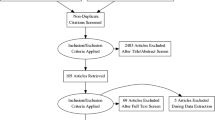Abstract
Educating and recruiting practitioners to work in community-based settings with persons with serious mental illness has become a national health personpower issue, particularly in underserved rural areas. This study was conceived in order to obtain a better basis for curriculum development and recruitment strategies. Graduate and undergraduate social work students, representing the greatest pool of mental health practitioners, were surveyed about their perceptions about working with persons with serious mental illness and about factors which are most important to their future job satisfaction. The findings indicate positive perceptions about work with the seriously mentally ill population by a significant number of students, and further reveal that students project job satisfaction factors related to intrinsic reward and ability to learn and grow in their work. The findings also reveal group differences related to educational level, previous work experience in mental health and expressed interest in working with persons with serious mental illness. Important implications for practitioner education, recruitment, administration and job development and ongoing in-service training are discussed.
Similar content being viewed by others
References
Bittle, R. (1988). Mental health services in a rural area: The integrated relationship between state hospital and community mental health center.Human Services in the Rural Environment, 12, 29–30.
Bowker, J., & Rubin, A. (1986).Studies on chronic mental illness: New horizons for social work researchers. Washington, DC: Council on Social Work Education.
Butler, A. (1990). A reevaluation of social work students' career interests.Journal of social work education, 26, 45–56.
Butler, B. (1990). Job satisfaction: Management's continuing challenge.Social Work, 112–117.
Davis, L. (1987). Model undergraduate curriculum. In M. Keenan (ed).The chronically mentally ill in rural areas: Model curriculum for social work education. Washington, D.C.: Council on social work education.
Foley, H. (1983)Madness and government: Who care for the mentally ill? Washington, DC: American Psychiatric Press.
Henry S. (1990). Non-salary retention incentives for social workers in public mental health.Administration in social work, 14, 1–15.
Herzberg, F., Mausner, B. & Synderman, B. (1959).The motivation to work. New York: John Wiley & Sons.
Johnson, P. & Rubin, A. (1983). Case management in mental health: A social work domain?Social Work, 28, 49–55.
Koeske, G. & Daimon Koeske, R. (1989). Work load and burnout: Can social support and perceived accomplishment help?Social Work, 243–248.
Maslow, A.H. (1978) A theory of human motivation. In J.M. Shafritz & A. C. Hyde (Eds.):Classic public administration (pp. 80–94). Oak Park, IL: Moore.
McNecky, R. (1988). Age and job satisfaction in human service employment.The Gerontologist, 28, 163–168.
Parker-Follet, M. (1978) The giving of orders. In J. M. Shafritz & A.C. Hyde (Eds.):Classics in public administration (pp. 29–37). Oak Park, IL: Moore.
Paulson, R. (1988).Educating social workers to work with long term seriously mentally ill persons & their families. Proceedings of the National Forum for Educating Mental Health Professional to Work with the Seriously Mentally Ill and their Families. U.S. Department of Health & Human Services. Rockville, MD.
Pippard, J. (1989) Training rural staff who work with people who are chronically mentally ill.Human Services in the Rural Environment, 12, 25–29.
Rapp, C. A. & Hanson, J. (1988). Towards a model of social work curriculum for practice with the chronically mentally ill.Community Mental Health Journal, 24(4), 270–281.
Rubin, A. & Johnson, P. (1982). Practitioner orientations toward serving the chronically disabled: Prospects for policy implementation.Administration in Mental Health, 10, 2–12.
Taylor, F. (1978). Scientific management. In J.M. Shafritz & A. C. Hyde (Eds.)Classics in public administration (pp. 17–20). Oak Park, IL: Moore.
Wagenfeld M. & Robin, S. (1976). The social worker in the rural community mental health center. In L. Ginsberg (Ed.):Social work in rural communities. New York: Council on Social Work Education.
Werrbach, G. and DePoy, E. (1992). A study of social worker student's interest, perceived competence and training needs related to work with persons with serious mental illness. Manuscript under review.
Author information
Authors and Affiliations
Additional information
This work was supported by grants from the State of Maine, Department of Mental Health and Mental Retardation, Bureau of Professional Education.
Rights and permissions
About this article
Cite this article
Werrbach, G.B., DePoy, E. Working with persons with serious mental illness: Implication for social work recruitment and retention. Community Ment Health J 29, 305–319 (1993). https://doi.org/10.1007/BF00761029
Issue Date:
DOI: https://doi.org/10.1007/BF00761029




